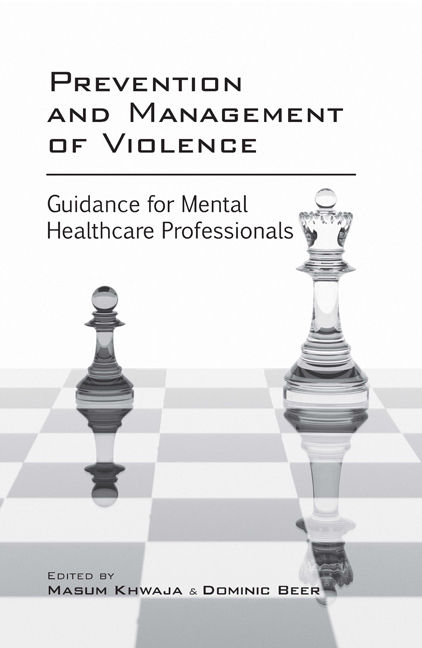Book contents
- Frontmatter
- Dedication
- Contents
- Abbreviations
- List of boxes and tables
- Working group
- Executive summary and recommendations
- 1 Legislation relevant to the management of violence by persons with mental disorders
- 2 Safeguarding vulnerable adults and children exposed to violence
- 3 Risk assessment and management
- 4 Risk prevention and non-pharmacological management of violence in acute settings
- 5 Use of medication and ECT in the management of violence
- 6 Post-incident management
- 7 Management of the risk of violence in the community
- 8 Management of violence in older adults
- 9 Management of violence in people with intellectual disability
- 10 Management of violence in prisons
- 11 Liaison with the police, Crown Prosecution Service and MAPPA
- 12 Information-sharing with victims of crime committed by persons with mental disorders
- 13 Clinical governance
- Appendix Organisations that victims of crime can contact
- Index
12 - Information-sharing with victims of crime committed by persons with mental disorders
- Frontmatter
- Dedication
- Contents
- Abbreviations
- List of boxes and tables
- Working group
- Executive summary and recommendations
- 1 Legislation relevant to the management of violence by persons with mental disorders
- 2 Safeguarding vulnerable adults and children exposed to violence
- 3 Risk assessment and management
- 4 Risk prevention and non-pharmacological management of violence in acute settings
- 5 Use of medication and ECT in the management of violence
- 6 Post-incident management
- 7 Management of the risk of violence in the community
- 8 Management of violence in older adults
- 9 Management of violence in people with intellectual disability
- 10 Management of violence in prisons
- 11 Liaison with the police, Crown Prosecution Service and MAPPA
- 12 Information-sharing with victims of crime committed by persons with mental disorders
- 13 Clinical governance
- Appendix Organisations that victims of crime can contact
- Index
Summary
As a general rule, a patient's treatment and progress in hospital are confidential and, unless the patient consents to information being shared, this limits the information that can be disclosed, for example about an offender's release (Department of Health, 2003).
Under the 2007 amendments of the Mental Health Act 1983, victims had their rights extended to being able to give their views about conditions which might be attached to offenders either being conditionally discharged or being considered for discharge under SCT.
The local probation board retains responsibility for liaising with the victim concerned. Further information regarding responsibilities for clinical staff who work with this group of patients – either in the NHS or the independent sector – can be found in guidance on the extension of victims’ rights under the Domestic Violence, Crime and Victims Act 2004 (Department of Health, 2008a).
Appendix I lists the support groups that victims of crime can contact.
Mental Health Act 1983 Code of Practice
The Mental Health Act 1983 Code of Practice (Department of Health, 2008b: p. 151) provides guidance on information for victims of crimes. According to this guidance, people who are victims of certain mentally disordered offenders detained in hospital now have rights under the Domestic Violence, Crime and Victims Act 2004 (Sections 35–45) to make representations and receive information about that patient's discharge.
This places a number of duties on hospital managers in relation to certain unrestricted patients detained under Part III, who have committed sexual or violent crimes. One of these duties is to liaise with victims in order to inform them whether the patient's discharge is being considered, whether the patient is to move to SCT and of any conditions on the CTO relating to contact with the victim and their family. Other duties include forwarding representations made by victims to people responsible for making decisions on discharge or SCT.
In other circumstances, concerning crimes of a different and not a sexual or violent nature, professionals should encourage (but cannot require) mentally disordered offender patients to agree to share information that will allow victims and their families to be informed of their progress. This may have the benefit of reducing the danger of harmful confrontations after a discharge of which victims were unaware.
- Type
- Chapter
- Information
- Prevention and Management of ViolenceGuidance for Mental Health Professionals, pp. 112 - 114Publisher: Royal College of PsychiatristsFirst published in: 2017

